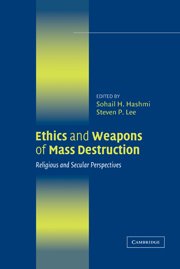Book contents
- Frontmatter
- Contents
- Tables and Figures
- Acknowledgments
- Abbreviations
- Ethics and Weapons of Mass Destruction
- Introduction
- 1 Weapons of Mass Destruction: A Brief Overview
- 2 The International Law Concerning Weapons of Mass Destruction
- PART ONE THE ORIGINAL DEBATE
- 3 Realist Perspectives on Ethical Norms and Weapons of Mass Destruction
- 4 Realism and Weapons of Mass Destruction: A Consequentialist Analysis
- 5 Natural Law and Weapons of Mass Destruction
- 6 War and Indeterminacy in Natural Law Thinking
- 7 Liberalism: The Impossibility of Justifying Weapons of Mass Destruction
- 8 A Liberal Perspective on Deterrence and Proliferation of Weapons of Mass Destruction
- 9 Christianity and Weapons of Mass Destruction
- 10 Christian Apocalypticism and Weapons of Mass Destruction
- PART TWO EXPANDING THE CONVERSATION
- PART THREE CRITICAL PERSPECTIVES
- Contributors
- Index
4 - Realism and Weapons of Mass Destruction: A Consequentialist Analysis
Published online by Cambridge University Press: 05 June 2012
- Frontmatter
- Contents
- Tables and Figures
- Acknowledgments
- Abbreviations
- Ethics and Weapons of Mass Destruction
- Introduction
- 1 Weapons of Mass Destruction: A Brief Overview
- 2 The International Law Concerning Weapons of Mass Destruction
- PART ONE THE ORIGINAL DEBATE
- 3 Realist Perspectives on Ethical Norms and Weapons of Mass Destruction
- 4 Realism and Weapons of Mass Destruction: A Consequentialist Analysis
- 5 Natural Law and Weapons of Mass Destruction
- 6 War and Indeterminacy in Natural Law Thinking
- 7 Liberalism: The Impossibility of Justifying Weapons of Mass Destruction
- 8 A Liberal Perspective on Deterrence and Proliferation of Weapons of Mass Destruction
- 9 Christianity and Weapons of Mass Destruction
- 10 Christian Apocalypticism and Weapons of Mass Destruction
- PART TWO EXPANDING THE CONVERSATION
- PART THREE CRITICAL PERSPECTIVES
- Contributors
- Index
Summary
Most of the chapters in this volume examine how to apply centuries-old religious or secular ethical perspectives to the relatively new issue of weapons of mass destruction. For a realist, the challenge is different – it is to take realist analyses of WMD and determine whether and how ethics fit into those analyses. In this chapter, I present realism's argument for a consequentialist form of moral reasoning in international politics. In particular, I examine the contribution that a particular strain of realism, structural realism, can make to such a consequentialist argument. I illustrate this through a structural realist analysis of weapons of mass destruction, explaining how structural realism understands these weapons and the consequences that follow from them. The aim of this chapter is thus to demonstrate the contribution that realism, especially the structural realist theory of Kenneth Waltz, can make to an ethical analysis of weapons of mass destruction.
Drawing on the work of Lea Brilmayer, I argue that realism mandates a consequentialist instead of a deontological approach to international politics. Actions or outcomes are judged to be ethical or unethical on the basis of their consequences, not on the basis of whether they comply with abstract moral principles. In addition, a realist analysis of international politics must begin with “the world as it is.” Thus, for realism, the first step of any analysis of WMD is to understand the characteristics of weapons of mass destruction and their consequences – the effect of these weapons on international politics.
- Type
- Chapter
- Information
- Ethics and Weapons of Mass DestructionReligious and Secular Perspectives, pp. 96 - 110Publisher: Cambridge University PressPrint publication year: 2004
- 1
- Cited by



